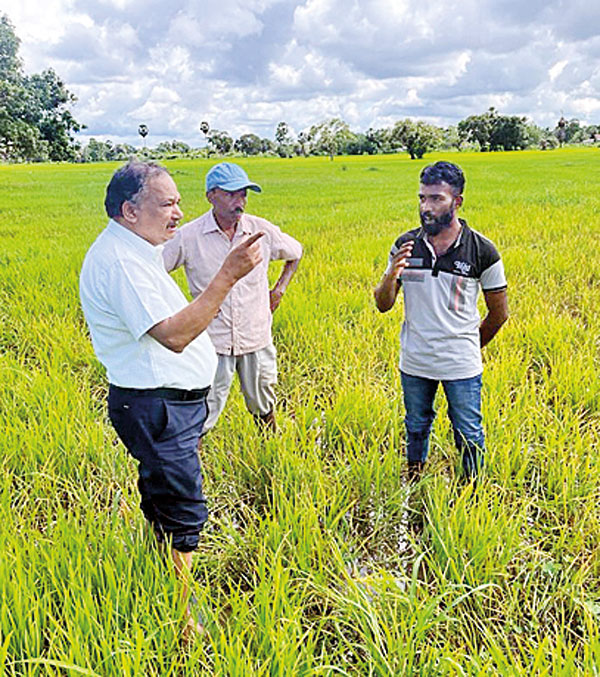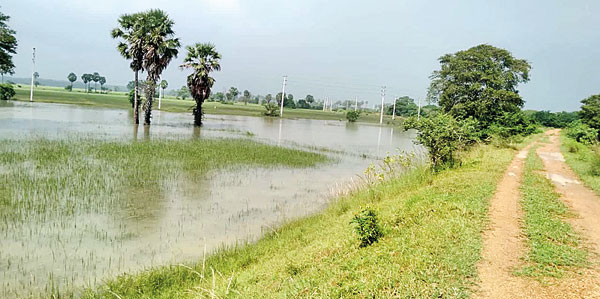For the northern farmers, the ongoing heavy rains and severe flooding have turned out to be a double whammy, as they had witnessed another challenge just weeks ago—a severe pest outbreak.
Thousands of acres of paddy land are underwater in the Kilinochchi, Mullaithivu, Vavuniya, and Jaffna districts following heavy rains, which are forecast to continue throughout this week as well.

Awareness campaign on pest control for farmers in Vavuniya
“It has become a routine now throughout the year where we are facing a severe drought (mid-year in the Yala season) or flooding in the Maha season that affects our harvest and pushes farmers more into poverty. Many farmers took loans and pawned jewels to begin the cultivation, only to be left with nothing in the end,” Iranamadu Farmers Federation Secretary Muththu Sivamohan said.
Amid the ongoing economic crisis, many farmers spent their savings, pawned valuables and borrowed, but now they face crop losses.
Hundreds of farming families in Kandawalai, Karachchi and Pooneryn of Kilinochchi and Oddusudan, Puthukudiyirippu, and Thunukkai were temporarily displaced due to floods.
In the Kilinochchi district alone, at least 8,000 acres of paddy land are destroyed due to the adverse weather, according to agrarian officials who are visiting fields to estimate the damage to the crop. B. Thewadaran, assistant commissioner of the Department of Agrarian Development in Kilinochchi, told the Sunday Times that farmers have begun to register their losses at agrarian offices and officers.
“The cost of production for farmers is around Rs 176,300 per acre based on our studies,” Mr. Thewadaran said.
As heavy rains across the North brought a significant amount of water through local rivers and swamps last week, the biggest irrigation tank in the region, Iranaimadhu, was opened last Friday after the water level reached 33.07 feet. The tank’s water is enough to irrigate 21,985 acres and can hold 36 feet of water.
Other tanks such as Kalmadhu, Pramanthanaru and Kanagampikai have reached full capacity as rains continued throughout last week. Agricultural and Agrarian Insurance Board (Kilinochchi) Assistant Director Purushoththamanpillai Poornachandran said that in addition to flooding, a significant number of paddy lands were damaged due to the spread of various rice diseases in the district. Officers are visiting fields to study the extent of the damage caused by floods as the water level recedes in some regions.
Weeks before the monsoon rains came, an epidemic of rice diseases such as white back plant hopper (WBPH), brown plant hopper (BPH), and leaf folder spread rapidly throughout the province, causing crop losses of thousands of acres.
According to officials, the climate conditions that prevailed at that time, with high humidity and temperatures, were favourable to the spread of the diseases.
“There has been very heavy rain in the past week in the Northern Province, and due to that situation, the disease is somewhat controlled,” says Provincial Agriculture Director Sukanthini Senthilkumaran.

An inundated paddyfield in Iranaimadhu
The weather was not favourable for applying chemical pesticides.
Another common fungal disease known as ‘brown spot’ also badly affected the paddy crop. The disease was last seen in 2020.
Adverse weather was also a contributing factor, according to Ms. Senthilkumaran. “We advised the farmers to clean the field for sanitation and advised them to maintain the seed rate (number of seeds sown per acre), as this too may be a primary cause of the disease.’’
For this Maha season, 101,650 hectares of paddy land were cultivated in the Northern Province, where Kilinochchi district alone accounted for 28,424 hectares.
Of the total paddy lands in the province, 14,736.52 hectares were damaged partially or completely by WBPH and BPH, while another 18,278.7 hectares were damaged by leaf folder disease.
The damage caused either by floods or pest attacks has not only led to income loss to the farmers but also put them under tremendous difficulties both economically and morally, with the main impact being that they are unable to ensure the availability of seed paddy for the next season.
Awareness programmes and agricultural instructors of the department also carried out regular inspections in fields. “We are all working together to get the condition under control,” Ms. Senthilkumaran said.
Sunday Times, Sri Lanka





